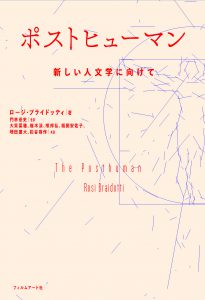
Rosi Braidotti Special Lecture:
What is the Human in the Humanities Today?
Date: 18:30-20:30, 4th June (Tuesday) ,2019
Venue: 5-109, Music Faculty Ueno Campus, Tokyo University of the Arts
Organized by: Graduate School of Global Arts (GA), Tokyo University of the Arts
Special Cooperation: Faculty of Letters, Kansai University
Speaker: Dr. Rosi Braidotti (Professor, Universiteit Utrecht)
Discussants: Dr. Takeshi Kadobayashi (Associate Professor, Kansai University)
Dr. Tomoko Shimizu (Associate Professor, Tsukuba University)
Interpreter: Kanoko Tamura
Chair: Yoshitaka Mōri (Professor, Tokyo University of the Arts)
Supported by: Grant-in-Aid for Scientific Research (KAKENHI: 17K02306): A Comprehensive Study for the Reconstruction of Aesthetics in the Age of Posthumanism and Grant-in-Aid for Scientific Research (KAKENHI: 17H02587): Towards New Theories of Media and Culture in the Post-Media Era: A Comparative Study of Creative Industries in the UK and Japan (Post Media Research Network/PMRN)
Free Admission. No pre-booking necessary. English-Japanese translation available.
WHAT IS THE HUMAN IN THE HUMANITIES TODAY?
By ROSI BRAIDOTTI
This lecture is built on the assumption that we are currently situated in a posthuman convergence between the Fourth industrial Age and the Sixth Extinction, between an advanced knowledge economy, which perpetuates patterns of discrimination and exclusion, and the threat of climate change devastation for both human and non-human entities. This convergence calls for a posthuman critical intervention in the form of intersecting critiques of western humanism on the one hand and of anthropocentrism on the other. The lecture discusses the impact of this convergence upon three major areas: the constitution of our subjectivity, the general production of knowledge, and the practice of the academic Humanities. It addresses directly the following questions: what are the implications of the fact that knowledge production is no longer the prerogative of academic or formal scientific institutions like the university? What are we to make of the sudden growth of new trans-disciplinary hubs that call themselves: the Environmental and Digital Humanities, the Medical, Neural and Bio-Humanities, and also the Public, Civic and Global Humanities and so on?
The lecture offers both a genealogy of these Critical Posthumanities and a theoretical framework by which to assess them.

